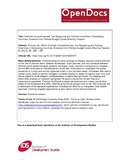Electoral Competitiveness, Tax Bargaining and Political Incentives in Developing Countries: Evidence from Political Budget Cycles Affecting Taxation
| dc.contributor.author | Prichard, Wilson | |
| dc.date.accessioned | 2018-05-03T13:41:01Z | |
| dc.date.available | 2018-05-03T13:41:01Z | |
| dc.date.issued | 2016-04-14 | |
| dc.identifier.citation | Prichard, W. (2016) Electoral Competitiveness, Tax Bargaining and Political Incentives in Developing Countries: Evidence from Political Budget Cycles Affecting Taxation, B.J.Pol.S. 48 , 427 – 457 | en |
| dc.identifier.uri | https://opendocs.ids.ac.uk/opendocs/handle/20.500.12413/13713 | |
| dc.description.abstract | Studies of political budget cycles in developing countries have generally sought to inform understanding of short-term fiscal dynamics, but can also offer unique insight into broader political dynamics in developing countries. This article correspondingly employs markedly improved data in order to study the impact of elections on tax collection, and draw broader lessons. It shows that while elections as a group have had no significant effect on tax collection, the subset of competitive elections has had a significant negative impact on pre-election tax collection; while this effect appears to be largest where incumbents are particularly unpopular. This provides powerful evidence that the impact of elections on political incentives in developing countries is conditioned by the existence of an electorally competitive opposition, while offering preliminary evidence that popular resistance to taxation by unpopular governments may be an important means by which taxpayers may generate pressure for improved governance. | en |
| dc.language.iso | en | en |
| dc.publisher | Cambridge University Press | en |
| dc.relation.ispartofseries | British Journal of Political Science;Vol 48 | |
| dc.rights | © Cambridge University Press 2016. This is an Open Access article, distributed under the terms of the Creative Commons Attribution licence (http://creativecommons.org/licenses/by/4.0/), which permits unrestricted re-use, distribution, and reproduction in any medium, provided the original work is properly cited. | en |
| dc.rights.uri | http://creativecommons.org/licenses/by/4.0/ | en |
| dc.subject | Governance | en |
| dc.title | Electoral Competitiveness, Tax Bargaining and Political Incentives in Developing Countries: Evidence from Political Budget Cycles Affecting Taxation | en |
| dc.type | Article | en |
| dc.rights.holder | Cambridge University Press | en |
| dc.identifier.externaluri | https://www.cambridge.org/core/journals/british-journal-of-political-science/article/electoral-competitiveness-tax-bargaining-and-political-incentives-in-developing-countries-evidence-from-political-budget-cycles-affecting-taxation/2C83B99205AE78B87A710BE3B21E05C2 | en |
| dc.identifier.team | Governance | en |
| dc.identifier.doi | 10.1017/S0007123415000757 | |
| rioxxterms.funder | Default funder | en |
| rioxxterms.identifier.project | Default project | en |
| rioxxterms.version | NA | en |
| rioxxterms.versionofrecord | https://doi.org/10.1017/S0007123415000757 | en |
| rioxxterms.funder.project | 9ce4e4dc-26e9-4d78-96e9-15e4dcac0642 | en |
Files in this item
This item appears in the following Collection(s)
Except where otherwise noted, this item's license is described as © Cambridge University Press 2016. This is an Open Access article, distributed under the terms of the Creative Commons Attribution licence (http://creativecommons.org/licenses/by/4.0/), which permits unrestricted re-use, distribution, and reproduction in any medium, provided the original work is properly cited.


